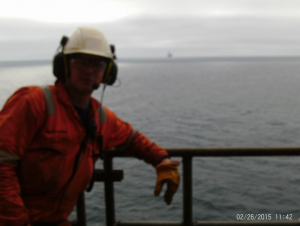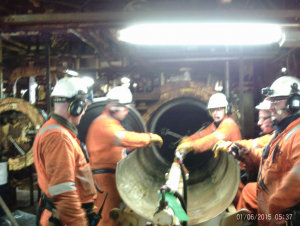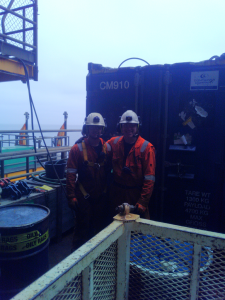Secret Lives: The Offshore Worker’s Struggles Revealed 
“Everyone tries to be upbeat about the situation because no’one is going anywhere in a hurry.”- A Junior Operator from Teesside.
The human side of one of the most labour intensive careers appears to have been largely overlooked by the media, despite the oil rig labourer’s audacious lifestyle.
 I interviewed a Junior Operator, who trained at Aberdeen University and is currently on a North Sea platform; he gives a more emotional account of life on an oil rig.
I interviewed a Junior Operator, who trained at Aberdeen University and is currently on a North Sea platform; he gives a more emotional account of life on an oil rig.
Considering the level of precision and skill required to perform the perilous jobs, exhaustion from being overworked is a great danger offshore, “Since the 3/3 rotation has been introduced, there seems to have been a lot more people going on the sick, for genuine reasons but possibly also non-genuine. As for fatigue, if ever I wasn’t feeling myself I would talk to my line manager and given the nature of the job he would help me because in this job you need to concentrate and be 100%, if not that is how mistakes are made.”
The institutionalised lifestyle and pressures make it inevitable that many workers end up needing psychological therapy at some point in their lives. A Teesside chartered clinical psychologist outlined to me that in therapy, “Many present with post-traumatic stress disorder following a dangerous experience such as a helicopter incident or witnessing a suicide. Mostly they express how emotional avoidance is either a coping mechanism or expected of them as a social norm and some find this hard.” She said, “I’ve had female cooks and cleaners from offshore, in with depression from being unable to settle down and have children; family planning is a common one.”
The dangerous environment with exposure to chemicals, and volatile fumes, can cause respiratory problems and brain damage. One mistake at work may be fatal on a grand scale so there is intense pressure on precision at work.
He confessed, “There isn’t the pastoral care required because of the ‘macho’ look offshore, people don’t want to seem weak and therefore will not seek the help needed.” Perhaps the labourers do fit the stereotype of being ultra masculine, supporting the psychologist’s claims that most of the men are emotionally avoidant by conforming to social norms in this ‘rig’ culture of being ‘macho’ males.
Their job takes place away from their social lives and loved ones; the operator admitted,
“It’s hard knowing that if anything goes on at home you cannot just be there in an instant. This is the hardest part of being away, if something isn’t right at home, there is nothing you can do about it. You get a sense of helplessness.”
It is rare to encounter media descriptions of the labourer’s experiences in lounge-time. On many platforms, a sense of great morale and camaraderie amongst workers contributes to their work ethic and emotional stability,“The best part of my job is definitely the people I work with,” he said. “We live together for 3 weeks at a time, I spend more time with some of them than actual family, we have a great bond and are always looking out for each other. However I have noticed since the change to an equal time rotation, tensions have been increasing and morale is at an all time low.”
This young operator helps to underscore not only the emotional challenges of his career but also his experiences of the impact the 3/3 changes have had on colleagues, witnessing job losses, marriage breakdowns and rising tensions. However what is noticeable is his gracious acceptance of the challenges in his job. He did not once deny how testing it is; but his immense bravery and grounded mindset help overcome each challenge. To maintain positivity in such a career requires a gargantuan amount of perseverance across the three weeks away and it is clear that this junior operator at least, demonstrates how it is done.